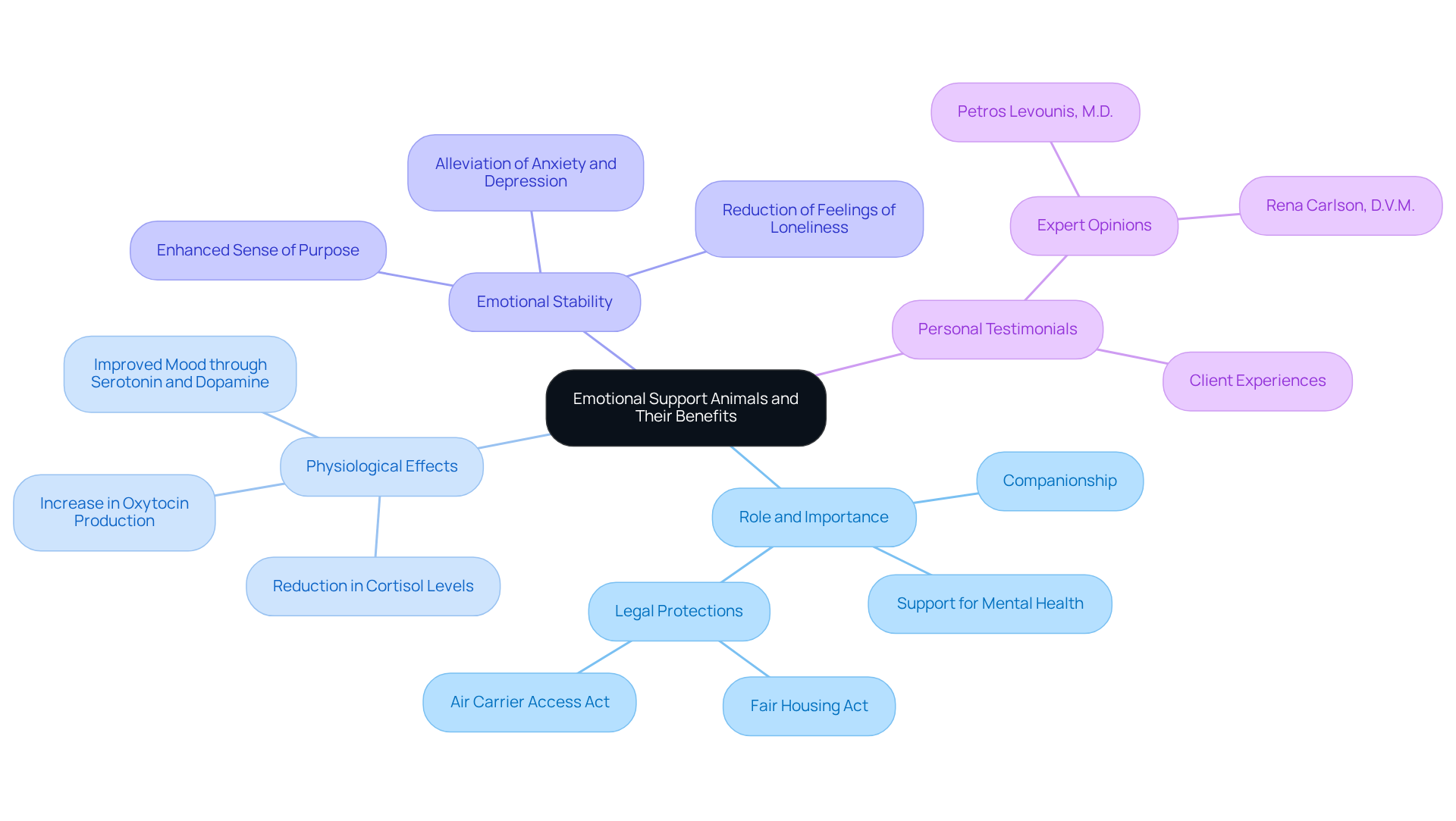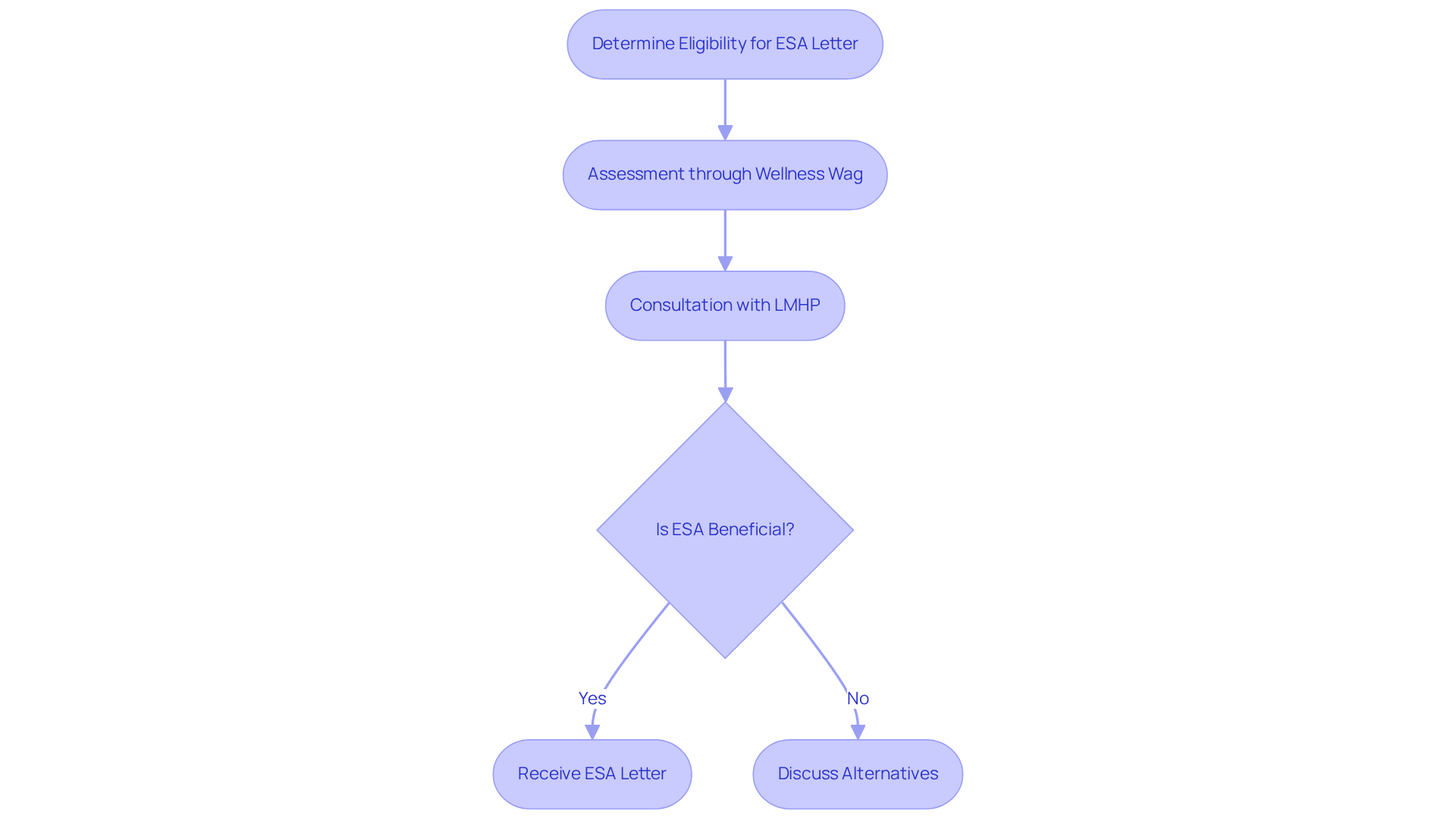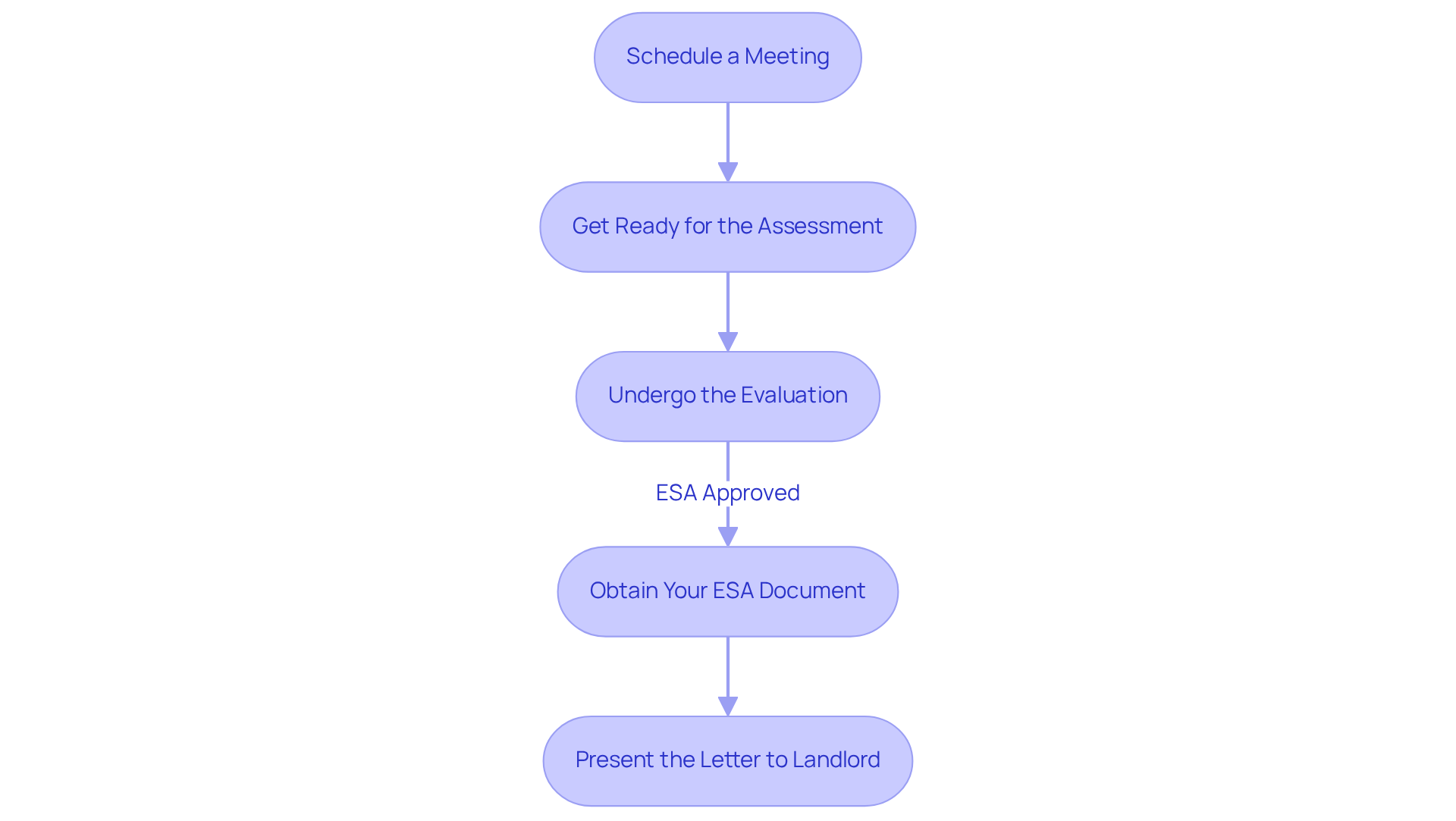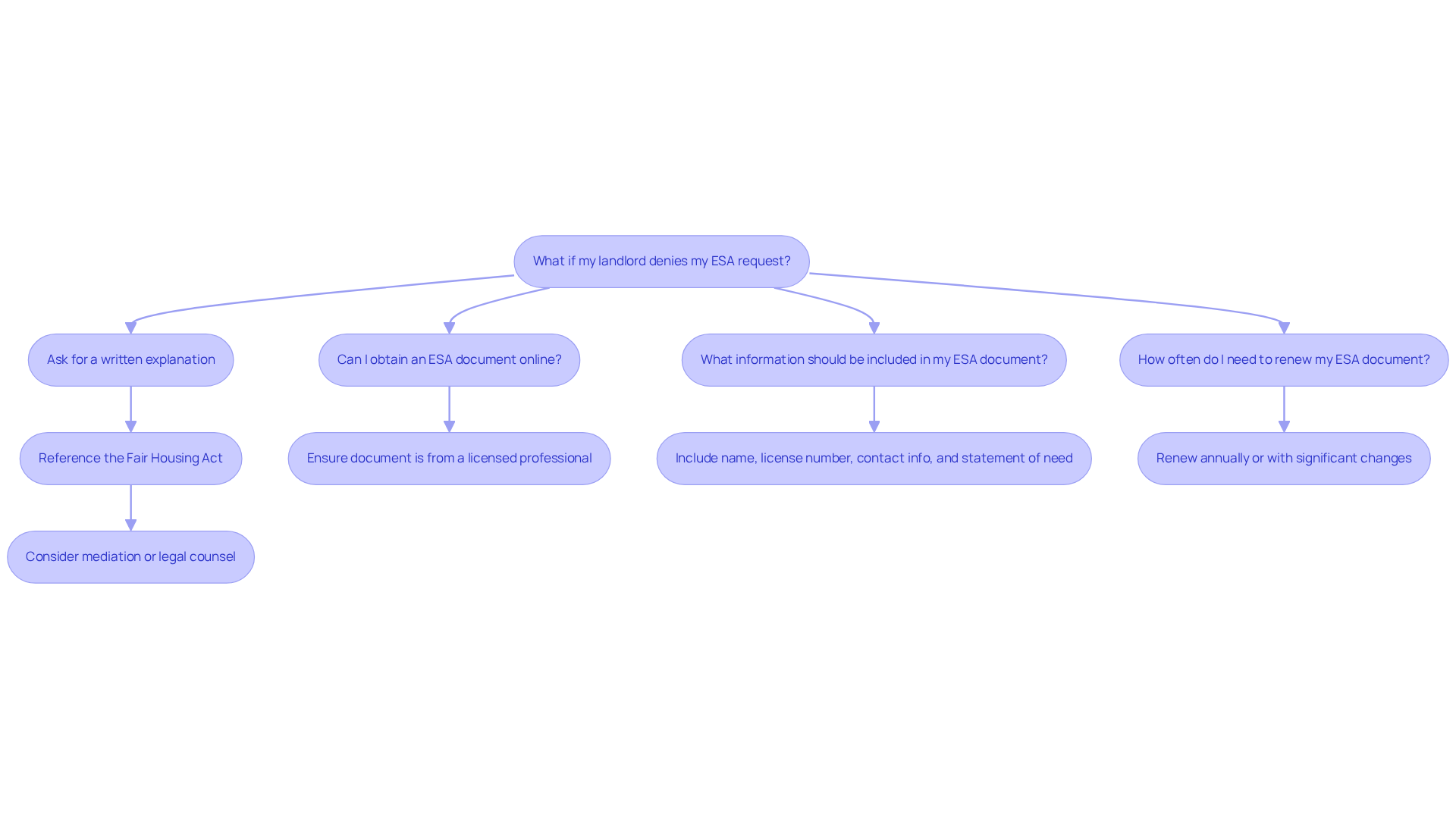

How to Get an Emotional Support Animal Letter for Your Landlord
by Lena Park
Last updated: September 5, 2025
Verified and Approved by:
Angela Morris,
MSW, LCSW
Fact Checked

Overview
To obtain an emotional support animal letter for your landlord, it is essential for individuals to first acknowledge their emotional struggles and have a diagnosed psychological condition. This often involves undergoing an assessment with a licensed mental health professional who can provide the necessary documentation.
It’s important to approach this process with transparency, as it not only helps in the evaluation but also ensures that you are aware of the legal protections afforded by the Fair Housing Act for those with valid ESA letters.
Remember, seeking support is a brave step towards healing, and the emotional support animal letter can be a compassionate solution that offers comfort and companionship during challenging times.
Introduction
In a world where emotional well-being often takes a backseat, understanding the profound impact that Emotional Support Animals (ESAs) can have on mental health is essential. These animals are more than mere companions; they provide critical support for individuals grappling with anxiety, depression, and various psychological challenges. Yet, for many, the journey to obtaining an ESA letter for housing can feel overwhelming.
What steps must one take to ensure their rights are protected?
How can they effectively communicate their needs to landlords?
This guide seeks to illuminate the intricacies of securing an emotional support animal letter, offering clarity and support for those in search of the comfort and companionship that an ESA can provide.
Understand Emotional Support Animals and Their Benefits
Emotional Support Animals (ESAs) are more than just companions; they are vital allies for individuals navigating emotional or psychological challenges. Unlike service animals, ESAs do not require specialized training; their primary role is to offer comfort and emotional stability. Have you ever felt overwhelmed by anxiety or depression? Research shows that interactions with ESAs can lead to significant reductions in these symptoms, enhancing emotional stability and providing a renewed sense of purpose. For college students grappling with emotional distress, ESAs can alleviate feelings of homesickness and loneliness, offering companionship during high-stress periods.
Engaging with an ESA can stimulate the release of oxytocin, a hormone linked to bonding and stress reduction, while also lowering cortisol levels, which are associated with stress. Understanding these benefits is essential for those seeking to enhance their emotional well-being through the companionship of an ESA. As Petros Levounis, M.D., M.A., poignantly states, “It’s easy to overlook the role of pets when we’re discussing psychological well-being,” highlighting the importance of recognizing the therapeutic potential of ESAs.
Linda S., a client of Wellness Wag, shared her experience: “Applying for an ESA through Wellness Wag was the best decision I made. It was an effortless process and the team was very professional.” With the growing recognition of these benefits, more individuals are discovering the profound impact ESAs can have on their emotional well-being and overall quality of life. Remember, you are not alone in your journey; support is available, and ESAs can be a compassionate part of your healing process.

Determine Eligibility for an ESA Letter
Navigating the complexities of mental health can be incredibly challenging, and for many, the emotional toll is significant. To qualify for an emotional support animal letter for landlord approval, individuals must have a diagnosed psychological condition that deeply affects their daily life. Common qualifying conditions include:
- Anxiety
- Depression
- PTSD
- Mood disorders
- Learning disabilities
- Substance use disorders
- Cognitive disorders
- Motor skill disorders
The journey begins with a brief assessment through Wellness Wag, where you can openly share your emotional support needs. Following this, a consultation with a licensed mental health professional (LMHP) will be arranged to conduct a thorough evaluation of your situation. During this assessment, it is vital to be transparent about your mental health history and discuss how an ESA could offer the support you deserve. If the LMHP determines that an ESA would be beneficial, they will provide an emotional support animal letter for landlord to confirm your need for an emotional support animal. This document must include specific language that aligns with the Fair Housing Act and the Americans with Disabilities Act, along with the LMHP’s details, license number, and a clear connection between your condition and the emotional support animal letter for landlord. Additionally, in some states, a minimum 30-day relationship with the LMHP is necessary before an ESA document can be issued. The turnaround time for obtaining an ESA document is typically 24-48 hours, ensuring a smooth process for acquiring legitimate ESA documents through Wellness Wag. As certified psychological specialists emphasize, a well-prepared ESA document is essential for individuals seeking the emotional benefits of animal companionship. Moreover, if the ESA letter does not qualify or meet your needs, Wellness Wag offers a refund guarantee, providing you with confidence in the legitimacy of the service.

Follow the Steps to Obtain Your ESA Letter
-
Schedule a Meeting: Reach out to a certified specialist in emotional support animal regulations. This initial step is crucial for ensuring that your evaluation meets legal standards and recognizes the important role of Emotional Support Animals in providing comfort and alleviating symptoms linked to psychological conditions.
-
Get Ready for the Assessment: Gather any relevant medical records and prepare to discuss your psychological history openly. Being honest about your challenges and the potential benefits of having an ESA is essential. As Meagan Mitchell, a Licensed Clinical Social Worker, notes, comprehensive evaluations are vital for certifying the need for an ESA, ensuring that the animal’s presence truly enhances your quality of life.
-
Undergo the Evaluation: During your appointment, the mental health professional will assess your condition. If they find that an ESA is appropriate for your treatment plan, they will prepare your ESA document. Typically, the approval duration for obtaining this document is around six weeks, based on a 2023 survey conducted by the Emotional Support Pet Association.
-
Obtain Your ESA Document: Your ESA document should include your name, the professional’s license number, and a statement confirming your need for an ESA. Ensure that it is signed and dated, as this documentation is vital for legal recognition. It’s important to understand that this document provides legal protections under the Fair Housing Act, allowing you to keep your emotional support animal in housing situations that may otherwise limit pets.
-
Present the emotional support animal letter for landlord: Once you have your emotional support animal letter for landlord, submit it to your landlord as part of your request for reasonable accommodation under the Fair Housing Act. This document serves as legal backing for having your emotional support animal nearby, even in places with ‘no pets’ rules, by providing an emotional support animal letter for landlord. Additionally, be mindful of the potential challenges if your ESA document expires, as this can impact your housing and travel arrangements. Throughout this process, Wellness Wag is committed to preserving the confidentiality of your medical information in compliance with HIPAA, ensuring that your personal and medical details are protected.

Troubleshoot Common Issues and Questions
-
What if my landlord denies my ESA request?: If your landlord denies your ESA request, it’s important to ask for a written explanation of their decision. This documentation can help you understand any specific issues or misunderstandings that may have influenced their response. Approach your landlord with these concerns, gently referencing the Fair Housing Act, which requires reasonable accommodations for tenants with disabilities by providing an emotional support animal letter for landlord. If needed, consider seeking mediation or legal counsel to help resolve the situation compassionately.
-
Can I obtain an ESA document online?: While many online services offer ESA documents, it’s essential to ensure that the document is issued by a licensed mental health professional. This verification helps you avoid scams and ensures that your emotional support animal letter for landlord meets legal requirements, which can significantly affect its acceptance by landlords.
-
What information should be included in my ESA document?: A valid emotional support animal letter for landlord must contain specific elements. It should include your name, the mental health professional’s license number, their contact information, and a clear statement confirming your need for an ESA. Additionally, the emotional support animal letter for landlord must be signed and dated to establish its authenticity, providing you with peace of mind.
-
How often do I need to renew my ESA document?: ESA letters do not have a fixed expiration date; however, it’s advisable to renew your letter annually or whenever there is a significant change in your mental health condition. Regular updates can help ensure compliance with landlord requirements and support your ongoing relationship with your emotional support animal.

Conclusion
Emotional Support Animals (ESAs) play a vital role in enhancing the emotional well-being of those navigating psychological challenges. This guide highlights the significance of ESAs, the eligibility criteria for obtaining an emotional support animal letter, and the essential steps to effectively communicate with your landlord. By understanding the legal protections and benefits associated with having an ESA, individuals can advocate for their needs and ensure they receive the support they truly deserve.
Throughout this article, we emphasize the therapeutic benefits of ESAs, the necessity of a legitimate emotional support animal letter, and the structured process required to secure one. From determining eligibility based on mental health conditions to presenting the letter to landlords, each step is crafted to empower individuals in their pursuit of emotional stability. Troubleshooting common issues further underscores the importance of being well-informed and prepared when facing potential obstacles.
Ultimately, the journey to obtaining an emotional support animal letter transcends mere paperwork; it is about cultivating a nurturing environment that fosters mental health and well-being. For those contemplating the inclusion of an ESA in their lives, taking proactive steps can lead to transformative benefits. Engage with licensed professionals, understand your rights under the Fair Housing Act, and embrace the companionship that an ESA can provide. The path to emotional healing may very well begin with the bond shared with an animal that offers unwavering support.
Frequently Asked Questions
What are Emotional Support Animals (ESAs)?
Emotional Support Animals (ESAs) are companions that provide comfort and emotional stability to individuals facing emotional or psychological challenges. Unlike service animals, ESAs do not require specialized training.
How do ESAs help with emotional or psychological challenges?
Interactions with ESAs can lead to significant reductions in symptoms of anxiety and depression, enhancing emotional stability and providing individuals with a renewed sense of purpose.
What specific benefits do ESAs provide to college students?
For college students dealing with emotional distress, ESAs can help alleviate feelings of homesickness and loneliness, offering companionship during high-stress periods.
How do ESAs affect hormone levels related to stress?
Engaging with an ESA can stimulate the release of oxytocin, which is linked to bonding and stress reduction, while also lowering cortisol levels, which are associated with stress.
What is the process of applying for an ESA through Wellness Wag?
According to a client named Linda S., applying for an ESA through Wellness Wag was an effortless process and the team was very professional.
Why is it important to recognize the role of pets in psychological well-being?
Recognizing the role of pets, such as ESAs, is essential as they can have a therapeutic potential that significantly impacts emotional well-being, as highlighted by Petros Levounis, M.D., M.A.
Certify Your Emotional Support Animal Today

Why You Can Rely on Us?
At Wellness Wag, we believe your pet deserves care rooted in both science and compassion. Each article is carefully researched, written in clear language for pet owners, and then reviewed by qualified professionals to ensure the information is evidence-based, current, and practical for real-life care. Our goal is to help you feel confident in making informed decisions about your pet’s health and well-being.
Reviewed by
Angela Morris, MSW, LCSW
Angela is a licensed clinical social worker with 20 years of experience in patient advocacy and community mental health. She has assisted numerous clients with ESA evaluations and brings a deep understanding of disability accommodations, ensuring that all information is accurate, supportive, and practical.

Written by :
Lena Park
Last Updated :
September 5, 2025












